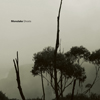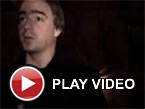Monolake, "Ghosts"
 Robert Henke has long been an influential elder statesman in the worlds of electronic music and sound design (he's partially responsible for the ubiquity of MacBooks), but Ghosts seems to indicate that it is a role that he is not entirely comfortable with.  Much of the album is every bit as sparsely futuristic, cerebral, and ominous as I have grown to expect from Monolake, but there are also some uncharacteristically blunt nods to some of dance music's more aggressive strains.  The success of that aesthetic experiment is certainly questionable, but Henke has otherwise completed yet another minor masterpiece of razor-sharp focus and clarity.
Robert Henke has long been an influential elder statesman in the worlds of electronic music and sound design (he's partially responsible for the ubiquity of MacBooks), but Ghosts seems to indicate that it is a role that he is not entirely comfortable with.  Much of the album is every bit as sparsely futuristic, cerebral, and ominous as I have grown to expect from Monolake, but there are also some uncharacteristically blunt nods to some of dance music's more aggressive strains.  The success of that aesthetic experiment is certainly questionable, but Henke has otherwise completed yet another minor masterpiece of razor-sharp focus and clarity.
I have a very complicated relationship with electronic dance music's avant-garde, as it is responsible for so much fascinating and innovative music, but almost all of it is innately doomed to rapid obsolescence.  Each groundbreaking new release ultimately just winds up being inspiration for the next generation of groundbreaking new releases in an endless cycle.  Also, many contemporary dance artists embrace a quasi-inhuman sensibility that clashes strongly with my own aesthetic preferences.  Ghosts is very much an embodiment of that machine-music vision: it is not exactly an extreme album, but in typical Henke fashion, it largely eschews any traces of warmth, imperfection, soul, or melody.  In theory, such a willfully faceless and beat-driven aesthetic should make Monolake largely indistinguishable from many other current artists, yet that is not the case at all.  Henke is, quite simply, one of the finest and most exacting producers in the world and he has a very distinct vision.  It is often a stark and alienating vision, certainly, but it sometimes achieves a cold, crystalline beauty as well.
The most obviously striking elements of Ghosts are the incorporation of industrial and dubstep textures and tropes in a few songs, like the wobbly sub-bass and the recurring robot-voiced "you do not exist" in the title piece.  "Ghosts" isn't quite a total misfire, but it does sound instantly dated and it's bizarrely straightforward for Henke–it sounds like he is either trying to pay loving homage to early '90s Haujobb, awkwardly connect with youth culture, or audition for a first-person shooter videogame soundtrack.  That is unfortunate, as he is much more inventive and abstract elsewhere, but "Ghosts" assumes disproportionate importance by being the opening song (and for being the only song with an attempt at a hook).  For me, the truly compelling aspects of the album are what isn't there: while Ghosts is a very beat-driven album, the beats are essentially supporting little more than an array of processed non-musical sounds and a whole lot of uncluttered space.
It takes close scrutiny to appreciate the full magnitude of Henke's talents, as he is neither a brilliant beatsmith or composer, yet he seems to ingeniously find ways to make those skills seem irrelevant to his work.  Or maybe he consciously trying to move beyond such concerns–it's especially hard to say with his beats, as they aren't particularly dance-friendly, visionary, or overtly complex, but they are unpredictable, shifting, and vibrant enough to stay compelling anyway.  Robert is an amazing sound processor though and he has a pretty unerring ear for how to make something wonderful out of seemingly very simple and unpromising materials.  In fact, part of the fun with this album is trying to figure out what exactly I am hearing, as "Foreign Object" sounds like racquetball game and "Taku" mostly sounds like it could have originated from just a glass of water and a marble.  I also enjoy Henke's talents as a merciless sound sculptor, as there are few other people in music so intent on perfect, undiluted clarity.  The bulk of Ghosts is kind of a high-wire act in which all musical safety nets and ropes have been removed, leaving only the songs' essence in sharp focus.
As impressive an accomplishment as Henke's hyper-simplicity and crystalline futurism is, it makes Ghosts pretty hard to connect with on any sort of deep level and creates a definite void of sorts.  Robert generally does an amazing job distracting me from all that with his unusual textures and insistent, constantly evolving beats, but occasional glimpses of something less bleakly inhuman highlight the fact that a vacuum certainly does exist.  Even something like a woman's voice dispassionately reciting a list of numbers ("Hitting the Surface") is enough to make my ears perk up, given the alienating contrast of the surrounding sounds.  In fact, "Aligning the Daemon" is probably my favorite piece on the album simply because it briefly features an organ chord: that small splash of color and musicality has enormous impact after experiencing nearly an hour of music with neither.  I have no idea if that was entirely by design (perhaps Henke was only teasing to amuse himself), but I definitely would've liked this album far more than I did if there had been other fleeting flashes of life and color amidst the clinking and clanking mechanized ominousness (I am sure he wouldn't care though).  Nevertheless, Ghosts is still an excellent album, albeit more in the "musicians and music critics will find much to admire here" sense than in the traditional one.
Samples:
 



